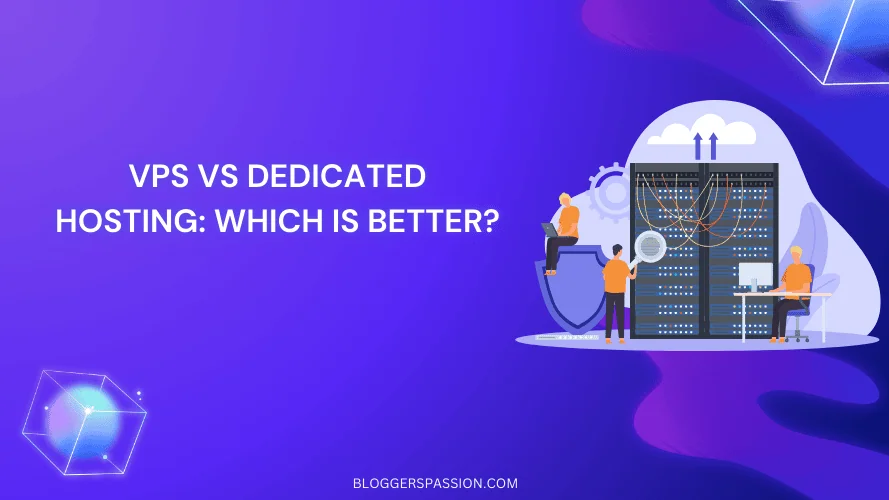By the end of this post, you will learn a lot of things about VPS Hosting and Cloud hosting, such as how they work, in which situations they are suitable, what their problems are, and more.
I promise you will be able to easily decide whether VPS hosting or Cloud hosting is suitable for your site.
Let’s dive in…
Table of Contents
- VPS Hosting vs Cloud Hosting [Comparison & Detailed Opinion]
- Real Life Comparison: Cloud Hosting vs VPS Hosting
- What is VPS Hosting? And It’s Main Advantages
- What is Cloud Hosting? And Its Main Advantages
- When Should VPS Hosting Be Preferred Over Cloud Hosting?
- When Should Cloud Hosting Be Preferred Over VPS Hosting?
- Is One More Affordable Than the Other – VPS vs Cloud Hosting?
- Conclusion: Which is Right For You?
- FAQs:
VPS Hosting vs Cloud Hosting [Comparison & Detailed Opinion]

Real Life Comparison: Cloud Hosting vs VPS Hosting
| Feature / Factor | VPS Hosting | Cloud Hosting |
| Scalability | Limited – Manual upgrade required | High – Instant or On-Demand resource scaling |
| Performance | Good, but it depends on your resource limits and server load | Excellent — uses load balancing and distributed resources |
| Cost | Fixed monthly cost — predictable but may pay for unused capacity | Pay-as-you-go — flexible but can lead to unexpected bills |
| Setup & Management | Requires technical knowledge for setup and maintenance | More complex — often needs cloud or DevOps experience |
| Uptime & Reliability | Good, but it depends on a single physical server | Very high — data mirrored across multiple servers |
| Customization & Control | Full root access | Limited control |
| Security | You manage security – needs manual setup of firewall, updates, etc | Built-in security features, but risk of misconfiguration |
| Data Recovery | Manual backups are usually required | Automatic backups and disaster recovery options |
| Email Handling | Self-managed — needs careful setup for deliverability | Also complex — often recommended to use third-party email services |
| Best For | Developers, agencies, and growing businesses with predictable site traffic | Scalable apps, global services, SaaS platforms, traffic-heavy websites |
| Common Issues | Server crashes due to misconfiguration, limited scalability | Unpredictable billing, complexity, vendor lock-in. |
| Perfect Use Case Example | Hosting 10 client websites on a managed VPS hosting | Running a global eLearning platform with traffic spikes from different regions |
What is VPS Hosting? And It’s Main Advantages

In simple language, VPS Hosting involves a main physical server machine that is divided into multiple virtual servers, each with its own dedicated CPU power and dedicated resources.
Compared to shared hosting, with VPS hosting you get the benefit of dedicated resources along with complete control and full customization.
However, under VPS hosting, if, for example, your server crashes, you unfortunately don’t have a backup server that can keep your web app or website running during the crash.
Here are some real-life benefits and problems of VPS hosting:
Pros of VPS Hosting:
1.) Dedicated Resources: You get dedicated resources (RAM, CPU, Storage) in VPS Hosting, which won’t let your busy sites, for example, an e-commerce store, slow down during traffic spikes.
2.) Improved Performance: Faster performance compared to shared servers.
3.) Advanced Security: Being in an isolated VPS environment, your site won’t be affected if another site’s server gets hacked.
4.) Full Root Access: At a developer level, if you need to run any custom script for your site or to smoothly run your web app, you can easily do so in VPS hosting because you have root access to the server.
5.) Scalability: Adding RAM or storage to an existing VPS server is generally easy and acceptable by most VPS hosting companies.
6.) Cost-Effective for Medium Projects: VPS servers are available at affordable pricing to efficiently handle the traffic of heavy traffic sites like news companies, whereas similar performance in Cloud hosting or dedicated servers would cost you significantly more.
Cons of VPS Hosting:
1.) Technical Knowledge is a Must: Most VPS hosting servers are unmanaged, meaning you have to manage the VPS server yourself. Non-tech users or bloggers with no IT support generally face problems in fully utilizing a VPS server.
2.) Security is Your Responsibility: You will have to take care of tasks like firewall configuration, malware scanning, updates, backups, and email server configuration yourself in VPS servers. A misconfiguration can increase the chances of your VPS system crashing.
What is Cloud Hosting? And Its Main Advantages

In Cloud Hosting, a copy of your website’s physical server is virtually cloned onto different servers in a cloud cluster.
This helps in delivering your site’s content to users through other servers even during unwanted issues like crashes, traffic spikes, and downtime.
Faster content delivery across the globe and excellent uptime are the main features of Cloud Hosting. However, Cloud Hosting comes at a much higher cost compared to VPS hosting and shared hosting.
Here are some real-life benefits and problems of Cloud hosting:
Cloud Hosting Pros:
1.) High Scalability: In Cloud hosting, the RAM and CPU usage of your servers can be scaled up or down according to your site’s demand, so in case your site experiences bulk traffic, you will never face a lack of resources.
2.) Best Uptime: Compared to all other hosting types including shared, VPS, and dedicated, you see reliable uptime in Cloud hosting servers. Because your site is mirrored on multiple cloud servers, in case of downtime, an instant server switch ensures your website users don’t experience any downtime.
3.) Real-time Billing: Most cloud servers offer you real-time billing, which means you only pay for the resources your site uses, so there are no high fixed monthly charges.
4.) Improved Global CDN Reach: Generally, cloud networks have cloud servers situated in different locations globally. In such a case, if traffic comes to your site from any location, the content of your site is delivered from the nearest cloud server, which helps in faster loading times and maintains the overall performance and health of the site.
Cloud Hosting Cons:
1.) Unpredictable Costs: Sometimes it becomes a very unpredictable situation, meaning it’s possible that sudden overnight traffic could push your billing up to $500. This can shock small website owners.
2.) Data Compliance and Privacy Challenges: Generally, Cloud servers are universally located, so your site’s stored data on different servers can get caught in legal compliance issues (e.g: GDPR, HIPAA). For example, a healthcare app faces legal issues for storing EU user data on US cloud servers.
3.) Difficult Debugging & Monitoring: Due to the presence of multiple cloud instances in cloud servers, it becomes difficult to track down which instance has crashed or has any issues.
When Should VPS Hosting Be Preferred Over Cloud Hosting?
VPS hosting is the better choice when you need:
| VPS Hosting Use Cases | Reason |
| More control and root access | You can fine-tune the server completely from scratch, and customize settings, scripts, and everything else according to your site’s goals. |
| Lower cost for small to medium websites | In VPS hosting, not only will it not be a burden on your pocket, but you will also be able to enable good performance on your growing site with a minimal budget. |
| Dedicated environments for clients | Agencies or SMBs can securely host multiple sites on a single VPS. |
| Development | Great sandbox for developers who to manage a full server |
| Security and compliance managed in-house | If you prefer full control over updates and firewalls. |
| Use Case 1 | A WordPress agency hosting 10 client sites on one managed VPS |
| Use Case 2 | A developer testing and deploying apps with full SSH/root control |
| Use Case 3 | A local business running a stable, medium-traffic eCommerce site |
When Should Cloud Hosting Be Preferred Over VPS Hosting?
Cloud hosting is the better choice when you need:
| Cloud Hosting Use Cases | Reason |
| High or Inpredictble Traffic | Cloud Hosting generally provides the benefit of instant scaling to sites during traffic spikes. |
| Global Reach | With the help of CDN, content will be served faster from global locations. |
| High uptime reliability | Because your site exists on multiple servers, it will remain live even during issues like downtime. |
| Use case example 1 | A SaaS product that is gaining users from 1,000 visitors to 100,000 users per month. |
| Use case example 2 | An eLearning platform whose audience is situated in up to 30+ locations. |
| Use case example 3 | A web app that doesn’t want to face even 0.1% downtime. |
Is One More Affordable Than the Other – VPS vs Cloud Hosting?
In my 10+ years of experience in the blogging and hosting industry, I have seen that generally, VPS hosting servers are cheaper and a good alternative to shared hosting, offering better performance.
However, the entry-level plans for Cloud hosting are generally high, and due to real-time billing, your pricing depends on your usage. If you have a large scalable budget, then it is best to host a site on cloud servers as they offer ultra-high-end performance to site readers.
Conclusion: Which is Right For You?
The market of both VPS and Cloud hosting is growing continuously.
In fact, The VPS hosting CAGR is 16.2% and the market size is expected to reach $8.3 billion by 2026. Whereas the market of Cloud Hosting is expected to reach $12 billion in 2026.
In a comparison of cloud computing vs VPS….
We found Both VPS and Cloud hosting are good options for growing and big sites that are seeking top-class performance for their website.
Now, what is right for you will depend on your needs. If you want full server control with predictable pricing for your site that has stable traffic, then VPS hosting can be a cost-effective solution for you.
But if your site experiences frequent traffic spikes and you want 100% uptime, then you can prefer Cloud hosting.
In short, prefer VPS Hosting for control and affordability, and prefer Cloud hosting for scalability and performance.
Explore More:
- Managed Hosting vs Shared Hosting [Compared Side by Side]
- WordPress Hosting vs Web Hosting [Which One Should You Choose?]
- VPS Hosting vs Dedicated Server Hosting [Choose Wisely]
- VPS Hosting vs Shared Hosting: Which One Should You Choose and Why?
FAQs:
Which is better for a growing sites: VPS or Cloud Hosting?
Cloud hosting is better for high-traffic sites because it can instantly scale resources when there is sudden traffic. VPS is good when your site traffic is mostly steady.
Is VPS hosting cheaper than cloud hosting in the long run?
Cloud hosting is better for high-traffic sites because it can instantly scale resources when there is sudden traffic. VPS is good when your site traffic is mostly steady.
Do I need technical skills to manage VPS or cloud hosting?
VPS requires more technical knowledge than cloud hosting.
Can I host multiple websites on VPS or cloud hosting?
You have complete freedom to deploy any number of sites on VPS servers. However, with cloud hosting, the number of sites you can set up directly depends on your hosting provider.

